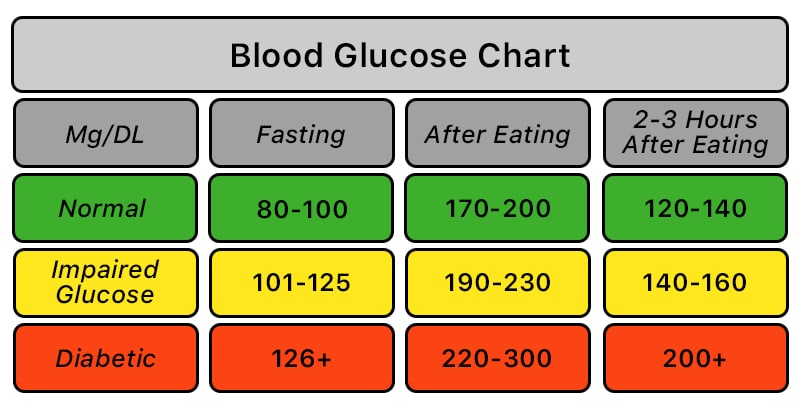What is normal blood sugar level

Normal blood sugar levels for adults and kids
Normal blood sugar levels for adults are usually 70–100 mg/dl before meals and 80-140 mg/dl two hours after beginning a meal. Normal blood sugar levels for kids under 18 years old may vary depending on their age, but generally the range is from 70 to 150 mg/dl before a meal, and up to 170 mg/dl two hours after starting a meal.
Ranges for normal blood sugar levels for different age groups
The normal range for blood sugar levels differs between age groups.
- For adults aged 18 and up, the range is between 70-99 mg/dL before meals and 70-140 mg/dL after meals.
- For children aged less than 5 years, the range is between 80-120 mg/dL before meals and less than 180 mg/dL after meals;
- for those aged 6 to 17, the range is within 80-130 mg/dL before meals and 130-180 mg/dL after meals.
| Age Group | Fasting Blood Sugar Levels (mg/dL) | Non-Fasting Blood Sugar Levels (mg/dL) |
|---|---|---|
| Children Less than 5 Years Old | 70-99 | 70-140 |
| 6-17 Years Old | 70-99 | 70-140 |
| 18-30 Years Old | 70-99 | 70-140 |
| 31-50 Years Old | 70-99 | 70-140 |
| People Over 50 | 80-130 | 100-160 |
These ranges reflect when a typically healthy person’s blood glucose tends to rise or fall depending on their age, providing a general guideline so people can check if they are in the right range for their current health status.
How long for blood sugar levels to return to normal
The length of time it takes for blood sugar levels to return to normal can vary depending on the cause of the high blood sugar and the individual’s overall health.
If the high blood sugar is caused by a one-time event such as eating a large meal, drinking alcohol, or taking certain medications, it may take a few hours for blood sugar levels to return to normal.
If the high blood sugar is caused by a condition such as diabetes, it may take longer for blood sugar levels to return to normal, and it may require changes in lifestyle, diet, and medication management.
It can take several days to several weeks for blood sugar levels to return to normal when making lifestyle changes such as increasing physical activity, eating a healthy diet, and managing stress.
Factors that affect blood sugar levels
There are a variety of factors that can affect blood sugar levels, including diet, exercise, stress, medication, and hormone levels. Eating foods that are high in carbohydrates and sugars can cause a rapid rise in blood sugar levels. Exercise helps to lower blood sugar levels, while stress can cause them to rise. Certain medications, such as steroids and some blood pressure medications, can also affect blood sugar levels. Additionally, hormonal changes, such as those that occur during pregnancy, can cause fluctuations in blood sugar levels.
Diets
Diet is one of the main factors that can affect blood sugar levels. Foods that are high in carbohydrates and sugars can cause a rapid spike in blood sugar levels, while foods that are low in carbohydrates and sugars can help to maintain healthy blood sugar levels. Examples of diets that can help to keep blood sugar levels in check include the Mediterranean diet and the DASH diet. The Mediterranean diet is rich in healthy fats, whole grains, fruits, vegetables, and nuts, and is low in processed foods and refined carbohydrates. The DASH diet emphasizes fruits, vegetables, whole grains, and low-fat dairy, and is designed to lower blood pressure and cholesterol. Both of these diets are high in fiber, which can help to slow the digestion of carbohydrates and keep blood sugar levels stable.
Exercise
Physical exercises can affect blood sugar levels. When you exercise, your body uses glucose for energy, which can help to lower your blood sugar levels. Regular physical activity can also help to improve your body’s sensitivity to insulin, which can help to keep blood sugar levels in the normal range. Examples of physical activity that can help to maintain healthy blood sugar levels include walking, jogging, cycling, swimming, and strength training. These activities can all increase your heart rate, help to build muscle, and increase your body’s sensitivity to insulin. In addition to helping to maintain normal blood sugar levels, regular physical activity can also help to improve overall health and well-being.
Medications
Medications can also affect blood sugar levels. Certain medications, such as steroids and some blood pressure medications, can cause an increase in blood sugar levels. Other medications, such as some diabetes medications, can cause a decrease in blood sugar levels. Examples of medications that can affect blood sugar levels include steroids, beta blockers, diuretics, and some antidepressants. Talk to your doctor before starting a new medication to make sure that it will not adversely affect your blood sugar levels.
Medical conditions such as diabetes and thyroid issues
Medical conditions, such as diabetes, polycystic ovarian syndrome and thyroid issues, can also affect blood sugar levels. Diabetes occurs when the body is unable to properly regulate its blood sugar levels, which can cause them to rise too high. Thyroid issues, such as hypothyroidism, can also affect blood sugar levels. Hypothyroidism can cause a decrease in blood sugar levels, while hyperthyroidism can cause an increase in blood sugar levels. Discuss with your doctor about any medical conditions you may have and how they can affect your blood sugar levels.
Stress
When a person is under stress, the body releases hormones, such as cortisol and adrenaline, which can cause a rapid rise in blood sugar levels. This is known as the “fight or flight” response. Examples of stressors that can cause this response include work stress, financial stress, relationship stress, and health-related stress. It is important to find ways to manage stress in order to maintain healthy blood sugar levels. Examples of ways to manage stress include exercise, relaxation techniques, talking to friends and family, and seeking professional help.
How to maintain normal blood sugar levels
Maintaining normal blood sugar levels is crucial to your health, especially if you’re at risk of developing diabetes or other chronic conditions. Here are some tips that you can use to keep your blood sugar levels within the normal range.
Healthy Eating Habits
One of the most important things that you can do is to have healthy eating habits. Eating a balanced diet that includes fruits, vegetables, whole grains, and lean protein can help regulate your blood sugar levels. It’s important to limit your intake of processed foods and sugary drinks as these can cause blood sugar levels to spike. As a rule, try to eat a variety of foods from all food groups and try to avoid skipping meals or eating large portions. Eating small, frequent meals throughout the day can also help maintain steady blood sugar levels.
Regular Physical Activity
Another important step is to make sure you get regular physical activity. Exercise helps improve insulin sensitivity, which means that your body can better regulate your blood sugar levels. Try to get at least 60 minutes of physical activity each day, but make sure to consult with your doctor about what types of exercises are safe and appropriate for you. Regular physical activity not only helps regulate blood sugar levels, but also has other health benefits like improving cardiovascular health, reducing stress, and maintaining a healthy weight.
Managing Stress
Managing stress is also important to help maintain normal blood sugar levels. When you’re stressed, your body produces hormones that can cause your blood sugar levels to rise. Try to find ways to manage stress like practicing relaxation techniques, getting enough sleep, and engaging in activities that you enjoy. It’s also important to talk to a trusted adult or healthcare professional if you’re feeling overwhelmed or anxious.
Regular Monitoring of Blood Sugar Levels
Finally, it’s important to regularly monitor your blood sugar levels. If you have been diagnosed with diabetes or have other risk factors for high blood sugar, it’s essential to check your blood sugar levels as directed by your doctor. Keeping a log of your blood sugar levels can also help you identify patterns and make adjustments to your diet and exercise routine as needed. If you notice any significant changes or have concerns about your blood sugar levels, don’t hesitate to talk to your healthcare professional.
Can you have diabetes with normal blood sugar
It is possible to have diabetes and have normal blood sugar levels. This is known as “latent autoimmune diabetes in adults” (LADA) or “type 1.5 diabetes”. LADA is a type of diabetes that is similar to type 1 diabetes, but it develops more slowly and is often mistaken for type 2 diabetes.
In LADA, the body’s immune system attacks and destroys the insulin-producing cells in the pancreas, just as in type 1 diabetes. However, in LADA, the destruction of these cells is slower, and the person may still produce some insulin for several years. This means that blood sugar levels may be normal or only slightly elevated, and the person may not have symptoms of diabetes.
It’s also possible to have diabetes and have normal blood sugar levels if the diabetes is well controlled by medication and lifestyle changes, or if the blood sugar level was checked during a period of low glucose level in the body (postprandial or after eating), or if the person has hypoglycemia unawareness and don’t feel the symptoms of low glucose level.
Can you have high a1c and normal blood sugar
It is possible to have a high A1C level and normal blood sugar levels. A1C is a measure of the average blood sugar level over the past 2-3 months, while blood sugar levels can fluctuate from day to day.
A high A1C level indicates that the blood sugar has been consistently elevated over a period of time, while normal blood sugar levels indicate that the blood sugar is within the normal range at the time it is checked.
There are a few possible explanations for this discrepancy:
- the person may have had high blood sugar levels in the past but they have recently been able to bring them down to normal range through changes in lifestyle or treatment.
- the person may have an underlying condition, such as diabetes, that affects the body’s ability to regulate blood sugar, but they are currently experiencing a period of good blood sugar control.
- A1C test results can be affected by certain factors such as anemia, kidney disease or genetic conditions.
It’s important to note that A1C levels are used to monitor long-term blood sugar control in people with diabetes, and it’s important to work with your doctor to interpret the A1C results and to monitor blood sugar levels over time.
Can a normal person have high blood sugar
Yes, a normal person can have high blood sugar levels. High blood sugar, also known as hyperglycemia, occurs when there is too much glucose (a type of sugar) in the blood. This can happen to anyone, regardless of whether they have diabetes or not.
High blood sugar can be caused by a variety of factors such as:
- Eating too much sugar or carbohydrates
- Skipping or delaying meals
- Consuming alcohol
- Lack of physical activity
- Stress
- Certain medications
- Hormonal imbalances such as an overactive thyroid
- Pancreatic conditions such as Pancreatitis
Can ketones be high with normal blood sugar
Yes, it is possible to have high levels of ketones in the blood with normal blood sugar levels.
Ketones are produced by the liver when the body is using fat for energy instead of glucose. This can happen when there is a lack of insulin, which is the hormone that regulates blood sugar levels, or when the body is in a state of starvation or fasting.
In a normal healthy body, ketones are usually produced in small amounts and are not harmful. However, high levels of ketones can be a sign of a serious condition called ketoacidosis, which can occur in people with diabetes when their blood sugar levels are too high and they do not have enough insulin to regulate it.
However, It’s possible to have high levels of ketones in the blood with normal blood sugar levels, this is called Nutritional Ketosis, which is a metabolic state characterized by the presence of ketone bodies in the blood and urine as a result of following a low-carbohydrate, high-fat diet. This state is considered safe and healthy when it’s done under the guidance of a healthcare professional.
Can you have insulin resistance and normal blood sugar
Yes, it is possible to have insulin resistance and normal blood sugar levels. Insulin resistance is a condition in which the body’s cells do not respond properly to insulin, the hormone that regulates blood sugar levels. This means that the body needs more insulin than normal to keep blood sugar levels in the normal range.
In some cases, the pancreas is able to produce enough insulin to overcome the resistance and keep blood sugar levels normal. This is known as “compensated insulin resistance”.
However, over time, the pancreas may not be able to keep up with the increased demand for insulin, and blood sugar levels may begin to rise. This can lead to the development of prediabetes or type 2 diabetes.
Insulin resistance is a risk factor for the development of type 2 diabetes and it’s important to be aware of the risk factors and to seek medical attention if you have any symptoms or if you have a family history of diabetes or metabolic disorders.
Summary
Maintaining normal blood sugar levels is essential for overall health and well-being. Fluctuations in blood sugar levels can lead to a range of health problems, including diabetes, heart disease, and stroke. It is recommended to work with medical specialists to develop a plan to maintain normal blood sugar levels.
In summary, by taking a proactive approach you can significantly improve overall health and well-being. So, take control of your health and work with your doctor to develop a plan that is tailored to your unique needs and preferences.








